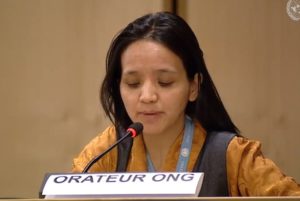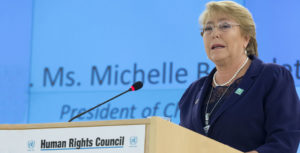The Peoples Republic of China [PRC] has been criticised for a lack of transparency regarding the effects of the COVID-19 virus on Tibetan areas at a recent United Nations Human Rights Council (UNHRC) summit.

Kalden Tsomo Photo: Screen grab
Speaking on behalf of the Society for Threatened Peoples, Kalden Tsomo, expressed concern and sadness at the spread of the virus but highlighted the fact “the actual number of effected cases in Tibetan areas remains still unknown due to China’s crackdown on freedom of speech and absence of transparency”. At the time of writing China had reported 81,193 COVID-19 cases nationally but, according to John Hopkins University, just one case in Tibet.
Speaking to Tsomo at the 43rd UNHRC Human Rights Council (UNHRC) Session, Czech representative, Petr Gajdušek, expressed concern “over the growing restrictions on access to information and the crackdown on citizen journalists […] during the health crisis”. Meanwhile German delegate, Hans-Peter Jugel, was unequivocal in demanding that the “unlawful mass detentions, torture and massive infringements of civic political and religious rights in… Tibet must end immediately”.
Responding to the condemnation, Chinese representative Liu Hua rejected “irresponsible accusations against China’s policy in Tibet” and suggested that the “lecturing” countries were doing so in an effort to “prevent [China’s] development”.
The exiled Central Tibetan Administration (CTA) reported in February that PRC officials were using the virus response to further suppress Tibetan religious and cultural expression. This included the detention of a WeChat user for posting a message that suggested people recite a prayer to ward off infection. Additionally, whilst quarantines have been enforced across much of PRC, Chinese police have forged ahead with a campaign to send a “million police into 10 million [Tibetan] homes” through 2020. This is reportedly to ensure PRC police “are in close contact with the masses”.

Michele Bachelet, UN Commissioner for Human Rights UNCHR
Previous reports indicate that China expects Michelle Bachelet, UN Commissioner for Human Rights UNCHR, to visit this year, though much of the focus of the visit is on East Turkestan [Ch:Xinjiang] and the “reports of disappearances and arbitrary detentions, particularly of Muslims”. East Turkestan is the Muslim ethnic minority home to the Uighur population who live under similar repression to the Tibetans under Chinese rule.
Whilst PRC’s invitation to the UNCHR to visit China was welcomed by delegates to the UNHRC session, it was unclear if the visit would include Tibetan areas. Tsomo, who also has a role as UN Advocacy Officer for the Tibet Bureau-Geneva, urged “the High Commissioner to press China for unfettered access to Tibet” stating that a failure to do so would render any visit to PRC “incomplete”.
Kalden Tsomo continued, “Tibetan people, whose rights have been severely curtailed by China, would like to bringCouncil’s attention that the High Commissioner’s expected visit to China is incomplete without a visit to Tibetan areas. What China is doing against Uighur community is the replication of what China has been doing, and continues to do, in Tibetan areas even today. Therefore we urge the High Commissioner to press China for unfettered access to Tibet”.




 Print
Print Email
Email